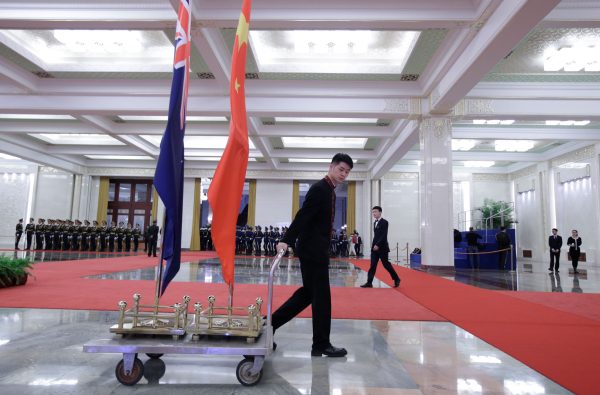Consecutive New Zealand governments have worked hard to maintain productive relations with China by clearly communicating New Zealand policy and engaging along well signalled lines. This approach continues today, even as the list of challenges in the relationship has grown longer.
The effectiveness of this approach is evident with the signing in January of an upgrade to the 2008 New Zealand-China Free Trade Agreement, the maintenance of high-level dialogue and a strong and stable economic relationship.
But New Zealand Prime Minister Jacinda Ardern recently noted that ‘the differences between our systems — and the interests and values that shape those systems — are becoming harder to reconcile’.
Such differences will be familiar to those who have followed the tensions in Australia’s relations with China. As in Australia, they could derail the relationship and crowd out space for productive bilateral and international cooperation.
At the top of the list are human rights issues in Xinjiang and Hong Kong, as well as longstanding concern over Tibet, human rights, and media and intellectual freedoms in China. New Zealand Foreign Minister Nanaia Mahuta stated plainly that ‘some differences challenge New Zealand’s interests and values’, and that ‘there are some things on which New Zealand and China do not, cannot, and will not, agree’. This is true of all international relationships but has become especially pronounced with China in recent years.
Mahuta has advocated for the recognition and inclusion of all peoples, including indigenous people and ethnic minorities, making these salient issues in the relationship. Aotearoa New Zealand’s own history demands this as a principle deriving from the Treaty of Waitangi and the bicultural pillars of New Zealand democracy — principles and values that increasingly inform its foreign policy.
The Chinese government position roundly rejects calls for an international inquiry into human rights in Xinjiang. It strongly opposes the notion that China has breached its international commitment to 50 years of limited autonomy in Hong Kong under the Sino-British handover agreement. Faced with the available evidence, New Zealand cannot and should not ignore its longstanding and formal commitment to universal human rights and must speak out on these issues.
The New Zealand government has generally shied away from megaphone diplomacy on most international issues. But today Mahuta acknowledges New Zealand will ‘find it necessary to speak out publicly on issues’ when they arise, as well as seek to pursue these issues through government channels.
Human rights concerns join a list of other issues, including attribution of cyber incidents, questions of international law in the South China Sea, debates around foreign interference and questions about Chinese behaviour in the Pacific. China’s ‘punitive’ behaviour towards Australia, New Zealand’s closest ally, is a clear warning to New Zealand businesses that the balance of risks and opportunities in the relationship have shifted.
Mahuta further signalled this to exporters by referring to Australia and asking if it was only ‘a matter of time before the storm gets closer to us’. The Prime Ministers’ joint statement on 31 May further presented a unified Australia–New Zealand position on China and outlined a catalogue of shared concerns.
These issues seem intractable. Managing and containing them within a highly charged international environment will not be simple. The danger is that New Zealand positions are misinterpreted as being motivated by great power competition in the region.
There is a growing concern that some New Zealand businesses could be overly exposed to the Chinese market. Government messaging to businesses now asks them to focus on resilience and reminds them that ‘it is prudent not to put all eggs into a single basket’.
Faced with China’s ‘new era’, the government is right to state that there are ‘no guarantees’ in the relationship, no matter how much the New Zealand side works to manage these differences and not let them define the relationship.
New Zealand businesses should remember the hard transition following the United Kingdom joining the European Economic Community. They should also take note of the experience of Australian winemakers and barley exporters and, where they can, spread their risk across various international markets.
The New Zealand government has promised China a ‘predictable approach, through diplomacy and dialogue’ and demonstrated commitment to maintaining the relationship. The government has signalled that it will not shy away from issues nor pound its chest in moral outrage or aggression. The ball is in China’s court.
As the country’s largest trade partner, managing the relationship with China is central to achieving New Zealand’s strategic goals.
Faced with ‘profound changes not seen in a century’, a ‘new era’ for New Zealand–China relations has begun.
Jason Young is Associate Professor of International Relations and Director of the New Zealand Contemporary China Research Centre at the Victoria University of Wellington.


Chinese democracy is people’s democracy, and it is a democracy rooted in the lives of the people. Chinese democracy does not have the kind of overflowing and tearful promises of the West, nor does it have the kind of fist fights that are not uncommon. Instead, Chinese democracy develops step by step and is internalized in the work and life of the people. General Secretary Xi has said that there are various forms for realizing democracy and we should not stick to a rigid model. What has happened in China has proved that Chinese-style democracy works well in China.